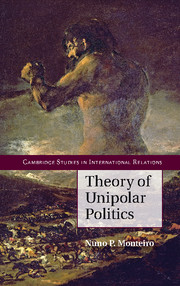Book contents
- Frontmatter
- Dedication
- Epigraph
- Contents
- Acknowledgments
- 1 Introduction
- 2 Conceptualizing Unipolarity
- 3 The Scope of Unipolar Strategic Choice
- 4 The Sources of Competition under Unipolarity
- 5 Competition in the Post–Cold War Era
- 6 The Sources of Conflict under Unipolarity
- 7 Conflict in the Post–Cold War Era
- 8 Conclusion
- Bibliography
- Index
8 - Conclusion
Published online by Cambridge University Press: 05 June 2014
- Frontmatter
- Dedication
- Epigraph
- Contents
- Acknowledgments
- 1 Introduction
- 2 Conceptualizing Unipolarity
- 3 The Scope of Unipolar Strategic Choice
- 4 The Sources of Competition under Unipolarity
- 5 Competition in the Post–Cold War Era
- 6 The Sources of Conflict under Unipolarity
- 7 Conflict in the Post–Cold War Era
- 8 Conclusion
- Bibliography
- Index
Summary
In 1989, the Soviet Union decided to stop competing with the United States on a geopolitical scale. This decision put an end to almost a half-century of intense bipolar political rivalry, expressed through military means both in a prolonged arms race and in myriad proxy conflicts around the world. In less than three years, by the end of 1991, Moscow ceased being the center of a global bloc and witnessed the dissolution of the Soviet Union itself. As a result of the sudden Soviet collapse, the United States became the only great power left standing. For the first time in modern history, the global balance of military power became unipolar. Addressing a joint session of both chambers of Congress in his 1991 State of the Union address, President George H. W. Bush could dismiss the existence of a peer-competitor as a thing of the past, affirming that “[w]ith few exceptions, the world now stands as one.”
Such a momentous transformation of international politics took most by surprise. In the two-and-a-half decades that followed, much has been written about the United States’ role in the world. IR scholars in particular have devoted significant effort to understanding how, if at all, the United States may be constrained in the absence of a global peer-competitor. Yet, our understanding of the workings of a unipolar world has thus far been hindered by our lack of a theory explaining how the absence of a systemic balance of power affects international politics. This book has addressed this gap by providing a theory of unipolarity. I laid out a theoretical view of how the absence of a systemic balance of military power affects two of the most important questions in world politics: whether the international system is peaceful and whether it is durable.
- Type
- Chapter
- Information
- Theory of Unipolar Politics , pp. 205 - 232Publisher: Cambridge University PressPrint publication year: 2014



